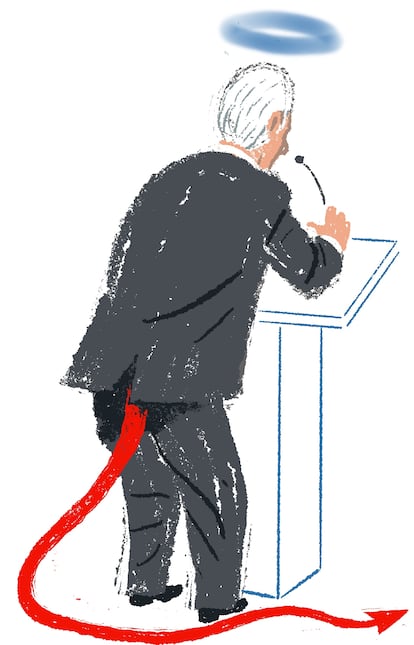López Obrador’s Mexico
The controversial politician will leave office this year, but history’s assessment of his presidency will be affected by the national dichotomy he amplified

Visionary or populist? Democratic or authoritarian? Progressive or conservative? Skilled politician or tropical messiah? Savior or destroyer of Mexico? And, finally: hero or villain? Just a few months before the end of Andrés Manuel López Obrador’s (AMLO) six-year term, any assessment of his presidency remains clouded by the national dichotomy he himself has amplified. There is no room for shades of gray or subtle distinctions. One must unambiguously support or oppose him, perpetuating the divisive rhetoric that fuels his political discourse – you’re either pro or anti-AMLO, a binary translation of his chronic “with me or against me” mindset.
His personality remains more elusive that his partisan supporters and critics care to admit. Emerging from the ranks of the Institutional Revolutionary Party’s (PRI) during its most dominant era, AMLO spent decades fighting the PRI only to reshape it into his own National Regeneration Movement (Morena), which thinly veils its own desire for dominance. While he claims to be left-wing, his policies often lean conservative. Despite championing himself as a foe of the corrupt ruling class, he has surrounded himself with many of its leaders. He vehemently opposes the neoliberal order, yet conforms to its principles by downsizing the government and rejecting progressive tax reform. Lastly, despite his promise to scale back the military, he has deployed it extensively in state enterprises, reminiscent of the 1910 Revolution.
AMLO is characterized by a cognitive dissonance that he has turned into his most powerful weapon. While his wearisome morning press briefings portray him as a radical progressive, staunchly defending the disadvantaged, his actions tell a different story. In practice, he has benefited the country’s wealthiest business interests, gaining unprecedented control over the country. This sets him apart from textbook populists like Hugo Chávez and Donald Trump, as well as any democratic leader. His elusive and ever-changing nature mirrors that of the PRI, which governed the country for over 70 years.
His commitment to the poor is immeasurable. In one of the world’s most unequal societies, he implemented two key measures: direct financial aid and a higher minimum wage. This earned their unwavering loyalty. The previous National Action Party and PRI administrations enabled unprecedented violence and the shameless enrichment of elites, as well as a crudely contrived opposition alliance led by a spirited but ineffective candidate. Polls indicate that AMLO’s preferred successor will have an easy path to the presidency.
AMLO could be considered a pragmatist if it weren’t for the demons that often overtake him. As a wistful outsider turned politician, he didn’t promise to make Mexico great again. Instead, he embarked on an immensely narcissistic “Fourth Transformation” (4T) of the country, likening himself to national heroes like José María Morelos, Benito Juárez and Emiliano Zapata. Unfortunately, he more closely resembles former presidents such as Adolfo López Mateos (1958-1964) and the despised Carlos Salinas (1988-1994). These two cogs in the PRI political machine boosted their popularity by creating elaborate fictions to mask the precarious reality of their times. Similarly, AMLO has constructed – or perhaps reconstructed – a grand narrative where every national misfortune is blamed on cunning enemies. As his term nears its end, this tedious refrain underscores the depth of his delusion.
The country that Claudia Sheinbaum will inherit has changed little since 2018. While the poorest have experienced some improvement in their lives, they have also faced setbacks. Unfortunately, AMLO’s eagerness to dismantle the policies and programs of his predecessors has led to the further weakening of Mexico’s fragile public health system. Promises to establish a national public health system like Denmark’s by the end of his term have proven to be nothing more than cynical nonsense. Public education hasn’t seen significant improvements or expansions. Moreover, despite increasing frustration and anger, massacres, murders, femicides and disappearances persist, as reported daily in the news.
AMLO’s security and justice policies have been as unsuccessful as those of Felipe Calderón (2006-2012) and Enrique Peña Nieto (2012-2018). In his pursuit of power, he waged a war against institutions that challenged him, such as the electoral institute and the judiciary. Unfortunately, he showed little concern for the lawlessness that consumes in Mexico. Instead of tackling rampant crime, with 99% of cases going unpunished and 350,000 murders since 2006, he prioritized constructing refineries, railways and airports, all under military control. His proposal to elect judges and ministers by popular vote is misguided and won’t enhance their effectiveness.
The PRI created a decades-long idealized vision of Mexico, and was a globally admired social democracy. Similarly, AMLO has crafted a distinct narrative called 4T, completely detached from reality. A troubling part of his legacy is the fervent devotion of his followers, who discourage any form of criticism and self-reflection, keeping Mexicans trapped in his illusion. Claudia Sheinbaum, a left-leaning scientist, should prioritize facts over her predecessor’s empty rhetoric. Mexico urgently needs remembrance, equality and justice.
Sign up for our weekly newsletter to get more English-language news coverage from EL PAÍS USA Edition
Tu suscripción se está usando en otro dispositivo
¿Quieres añadir otro usuario a tu suscripción?
Si continúas leyendo en este dispositivo, no se podrá leer en el otro.
FlechaTu suscripción se está usando en otro dispositivo y solo puedes acceder a EL PAÍS desde un dispositivo a la vez.
Si quieres compartir tu cuenta, cambia tu suscripción a la modalidad Premium, así podrás añadir otro usuario. Cada uno accederá con su propia cuenta de email, lo que os permitirá personalizar vuestra experiencia en EL PAÍS.
¿Tienes una suscripción de empresa? Accede aquí para contratar más cuentas.
En el caso de no saber quién está usando tu cuenta, te recomendamos cambiar tu contraseña aquí.
Si decides continuar compartiendo tu cuenta, este mensaje se mostrará en tu dispositivo y en el de la otra persona que está usando tu cuenta de forma indefinida, afectando a tu experiencia de lectura. Puedes consultar aquí los términos y condiciones de la suscripción digital.









































